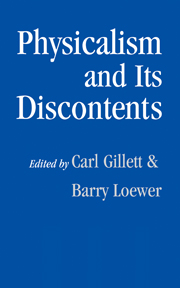Book contents
- Frontmatter
- Contents
- Contributors
- Preface
- Part I Physicalism
- Part II Physicalist Discontents
- 9 The Roots of Reductionism
- 10 The Significance of Emergence
- 11 The Methodological Role of Physicalism: A Minimal Skepticism
- 12 Physicalism, Empiricism, and Positivism
- Part III Physicalism and Consciousness: A Continuing Dialectic
- References
- Index
10 - The Significance of Emergence
Published online by Cambridge University Press: 02 November 2009
- Frontmatter
- Contents
- Contributors
- Preface
- Part I Physicalism
- Part II Physicalist Discontents
- 9 The Roots of Reductionism
- 10 The Significance of Emergence
- 11 The Methodological Role of Physicalism: A Minimal Skepticism
- 12 Physicalism, Empiricism, and Positivism
- Part III Physicalism and Consciousness: A Continuing Dialectic
- References
- Index
Summary
This chapter is an attempt to understand the content of and motivation for a popular form of physicalism, which I call nonreductive physicalism. Nonreductive physicalism claims that although the mind is physical (in some sense), mental properties are nonetheless not identical to (or reducible to) physical properties. This suggests that mental properties are, in earlier terminology, emergent properties of physical entities. Yet many nonreductive physicalists have denied this. In what follows, I examine their denial, and I argue that on a plausible understanding of what emergent means, the denial is indefensible: nonreductive physicalism is committed to mental properties being emergent properties. It follows that the problems for emergentism – especially the problems of mental causation – are also problems for nonreductive physicalism, and they are problems for the same reason.
The structure of the chapter is as follows. In the first section, I outline what I take to be essential to nonreductive physicalism. In the second section I attempt to clarify what is meant by emergent, and I argue that the notion of emergence is best understood in terms of the idea of emergent properties having causal powers that are independent of the causal powers of the objects from which they emerge. This idea, ‘downward causation,’ is examined in the third section. In the final section I draw the lessons of this discussion for the contemporary debate on the mind-body problem.
- Type
- Chapter
- Information
- Physicalism and its Discontents , pp. 207 - 224Publisher: Cambridge University PressPrint publication year: 2001
- 29
- Cited by



